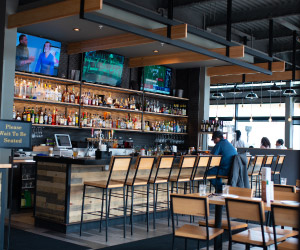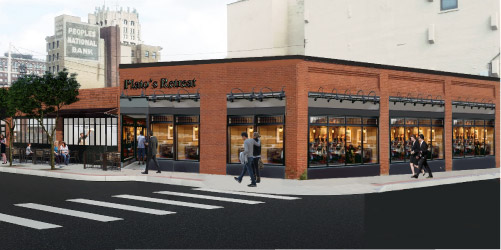September 4, 2020
Michigan Good Food Fund Spotlight
During this difficult time, we’re honoring essential workers more than ever—and there are few jobs…
Share

 During this difficult time, we’re honoring essential workers more than ever—and there are few jobs as essential as feeding our communities. The trials and challenges of 2020 have proven just how important local food businesses are to the fabric of a community: to its well-being, endurance, and solidarity. In stressful times, a familiar face at the market or a favorite takeout order from a local restaurant are stabilizing and comforting. At Michigan Good Food Fund, we are proud to support local food businesses dedicated to helping their neighborhoods thrive.
During this difficult time, we’re honoring essential workers more than ever—and there are few jobs as essential as feeding our communities. The trials and challenges of 2020 have proven just how important local food businesses are to the fabric of a community: to its well-being, endurance, and solidarity. In stressful times, a familiar face at the market or a favorite takeout order from a local restaurant are stabilizing and comforting. At Michigan Good Food Fund, we are proud to support local food businesses dedicated to helping their neighborhoods thrive.
Forty Acres Soul Kitchen
One of those entrepreneurs is Darel Ross, who, with business partner Lewis Williams, co-owns Forty Acres Soul Kitchen, one of the only Black-owned restaurants in Grand Rapids. Celebrating African-American cuisine and culture, Forty Acres serves healthy twists on soul classics like gumbo and chicken and waffles, including vegan options. Situated in the redeveloping Wealthy Street District, an area with a deep history of Black-owned businesses, Forty Acres represents Ross and Williams’ commitment to sharing their culture’s history and culinary traditions. While Ross and Williams are deeply rooted in Grand Rapids, they also see their mission as larger than just one restaurant.

“Michigan Good Food Fund saw what was special in Forty Acres and were one of the few people who funded us,” Ross said of the $50,000 loan they received. “And not only money, but capacity: support to grow to multiple locations. They not only invested in our model; they invested in our growth.”
That growth radiates outward: 80% of Forty Acres’ employees are Black (and many can walk to work). As Forty Acres looks ahead to expansion, Ross and Williams will use what they call the Black Effect Growth Strategy to make a similar impact, identifying ideal locations in predominantly black areas surrounded by gentrifying neighborhoods. It’s a strategy that will help strengthen Black communities as they’ve done in Grand Rapids.
During the COVID pandemic, Forty Acres committed to keeping its employees safe and serving healthy food to its community. “It’s soul food, so it’s always comforting,” Ross said. “We were closed for over a month, and it was exciting to reopen over the 4th of July and see everybody smiling.”
Placita Olvera
Commitment to the community is also at the heart of Javier and Pablo Olvera’s work. The brothers own Supermercado Mexico, Grand Rapids’ largest Latino market, with three locations, a taqueria, and a bakery. The markets have all been working harder to keep providing customers fresh groceries during the pandemic.

The Olveras are also working with Michigan Good Food Fund to open Placita Olvera, a hub of Hispanic food and community in a former factory on Grandville Avenue. Located in the primarily Latino neighborhood of Roosevelt Park, Grandville Avenue is undergoing an exciting revitalization effort called Viva La Avenida.
This will be a true community center on the avenue, with a Mexican brewery, local restaurants, business incubator, and Hispanic farmers market. Michigan Good Food Fund provided a $100,000 loan through Northern Initiatives to support phase one of this $2 million project, which provided working capital and support for architectural drawings and accounting services.
“We’re looking to make a change in our community,” Javier Olvera said. “We don’t want to just take; we want to give back. We want to grow our community.”
Peach Market
It’s a spirit common across Michigan Good Food Fund projects. In Jackson, Michigan, Olivia Laing and her husband, Andrew Kokas, began by seeing a need in their community: There hadn’t been a fresh food market downtown in two generations. So the couple set to work developing Peach Market in an old building full of character—and structural challenges.
 With two Michigan Good Food Fund Catalytic Investment Awards, Michigan Good Food Fund loan funding through Northern Initiatives, and investments of the couple’s own money, Peach Market was able to continue construction efforts and make meaningful progress. In addition to increasing healthy food access with a wide selection of locally-grown and regionally-produced foods, the store is also anticipated to create 11 full-time and 21 part-time jobs.
With two Michigan Good Food Fund Catalytic Investment Awards, Michigan Good Food Fund loan funding through Northern Initiatives, and investments of the couple’s own money, Peach Market was able to continue construction efforts and make meaningful progress. In addition to increasing healthy food access with a wide selection of locally-grown and regionally-produced foods, the store is also anticipated to create 11 full-time and 21 part-time jobs.
“Whether a future customer is a downtown office worker, a federally supported older American, a millennial looking for an urban experience, or one of the many low-income residents who live downtown, everyone needs a convenient place to get healthy food,” Kokas said. “We intend to make sure they have that option in downtown Jackson.”
The Local Grocer
In Flint, Michigan, The Local Grocer is operating with a similar mission, bringing fresh, healthy food to an area with few such options—plus, most of the fresh produce comes from producers within 60 miles of the store.
 By fostering relationships from farm to market—The Local Grocer has hosted events from 80th birthday parties to meetings of women farmers—owner Erin Caudell has created a crucial service for her community. Michigan Good Food Fund helped Erin with capacity-building training and educational programs, including Zingerman’s Customer Service Training. “These opportunities helped us connect in to other business owners and gave us some introductory education,” Caudell said.
By fostering relationships from farm to market—The Local Grocer has hosted events from 80th birthday parties to meetings of women farmers—owner Erin Caudell has created a crucial service for her community. Michigan Good Food Fund helped Erin with capacity-building training and educational programs, including Zingerman’s Customer Service Training. “These opportunities helped us connect in to other business owners and gave us some introductory education,” Caudell said.
Now, The Local Grocer has an even bigger role to play in Flint: Since COVID, Erin and her team have begun offering Friday Dinners: comforting family-size meals—vegan, vegetarian, or meat-based—largely sourced from her own farm or friends’ farms. The Local Grocer is producing meals for healthcare workers through the Southeast Michigan Frontline Foods program, delivering 300-350 meals a week, and has partnered with the University of Michigan Flint to replace their meal plan with vouchers that students can spend at The Local Grocer and other downtown businesses. “All of these programs have helped keep us afloat and have helped us alter our model when other parts of our business has faltered,” Caudell said.
The challenges of 2020 are many, as are the challenges of food entrepreneurship. Many traditional lenders don’t understand the specific needs of food clients and are averse to the risks of their projects.
“These projects have long incubation periods and need customized technical assistance and financing products,” said Mary Donnell, Michigan Good Food Fund Program Manager with Capital Impact Partners, a founding partner of this initiative. “They are not easy wins. These projects take time, nurturing, and coaching, and they also need a lender who is willing to work with good food entrepreneurs from growers to grocers and at all different stages.”
That’s where Michigan Good Food Fund steps in, ensuring that one of the most important aspects of a community—its nourishment—is not lost.
Stay Connected
Subscribe to receive the latest food business opportunities, resources, and entrepreneur highlights directly in your inbox.